Conquest of Mexico (1520)
![]()

Wall Art and Photo Gifts from Mary Evans Picture Library
Conquest of Mexico (1520)
Conquest of Mexico (1520). Entry of Hern n Corts in Tlaxcala after the battle of Otumba
Mary Evans Picture Library makes available wonderful images created for people to enjoy over the centuries
Media ID 8267847
© Mary Evans Picture Library 2015 - https://copyrighthub.org/s0/hub1/creation/maryevans/MaryEvansPictureID/10209200
1520 Conquest Entry Hern Mexico Otumba Aisa Tlaxcala
EDITORS COMMENTS
Conquest of Mexico (1520): Entry of Hernán Cortés in Tlaxcala after the Battle of Otumba" This historic print depicts a pivotal moment in the conquest of Mexico by Spanish conquistadors, specifically the entry of Hernán Cortés and his troops into the city of Tlaxcala following their victory in the Battle of Otumba. The Battle of Otumba, fought on February 2, 1520, marked a turning point in the conquest as it allowed Cortés to gain a crucial alliance with the Tlaxcalans, who became valuable allies in his campaign against the Aztec Empire. The image shows Cortés, dressed in armor and riding a horse, leading his troops into the city, which is adorned with colorful buildings and bustling marketplaces. The Tlaxcalans, represented by the crowd gathered at the city gates, welcome the Spanish with open arms, signifying their allegiance. The scene is filled with a sense of celebration and triumph, as the Spanish conquistadors have successfully secured a new ally in their quest to conquer the Aztec Empire. The Conquest of Mexico, which began in 1519, lasted for over eight years and resulted in the Spanish taking control of the Aztec Empire and establishing the Viceroyalty of New Spain. This print serves as a visual representation of the complex and dynamic nature of the conquest, highlighting the importance of alliances and strategic military victories in the face of formidable opposition. The Battle of Otumba was one of several significant battles during the conquest, and its outcome played a crucial role in the eventual success of the Spanish forces. This print offers a glimpse into the rich history of Mexico and the pivotal role that the Conquest of Mexico played in shaping the cultural, political, and social landscape of the region.
MADE IN THE USA
Safe Shipping with 30 Day Money Back Guarantee
FREE PERSONALISATION*
We are proud to offer a range of customisation features including Personalised Captions, Color Filters and Picture Zoom Tools
SECURE PAYMENTS
We happily accept a wide range of payment options so you can pay for the things you need in the way that is most convenient for you
* Options may vary by product and licensing agreement. Zoomed Pictures can be adjusted in the Cart.



